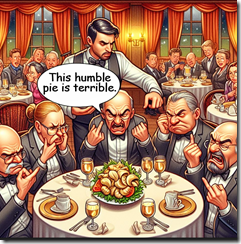Lunch at a Big Time Publisher: Humble Pie and Sour Words
June 4, 2024
 This essay is the work of a dinobaby. Unlike some folks, no smart software improved my native ineptness.
This essay is the work of a dinobaby. Unlike some folks, no smart software improved my native ineptness.
Years ago I did some work for a big time New York City publisher. The firm employed people who used words like “fungible” and “synergy” when talking with me. I took the time to read an article with this title: “So Much for Peer Review — Wiley Shuts Down 19 Science Journals and Retracts 11,000 Gobbledygook Papers.” Was this the staid, conservative, and big vocabulary?
Yep.
The essay is little more than a wrapper for a Wall Street Journal story with the title “Flood of Fake Science Forces Multiple Journal Closures Tainted by Fraud.” I quite like that title, particularly the operative word “fraud.” What in the world is going on?
The write up explains:
Wiley — a mega publisher of science articles has admitted that 19 journals are so worthless, thanks to potential fraud, that they have to close them down. And the industry is now developing AI tools to catch the AI fakes (makes you feel all warm inside?)
A group of publishing executives becomes the focal point of a Midtown lunch in an upscale restaurant. The titans of publishing are complaining about the taste of humble pie and user secret NYAC gestures to express their disapproval. Thanks, MSFT Copilot. Your security expertise may warrant a special banquet too.
The information in the cited article contains some tasty nuggets which complement humble pie in my opinion; for instance:
- The shut down of the junk food publications has required two years. If Sillycon Valley outfits can fire thousands via email or Zoom, “Why are those uptown shoes being dragged?” I asked myself.
- Other high-end publishers have been doing the same thing. Sadly there are no names.
- The bogus papers included something called a “AI gobbledygook sandwich.” Interesting. Human reviews who are experts could not recognize the vernacular of academic and research fraudsters.
- Some in Australia think that the credibility of universities might be compromised. Oh, come now. Just because the president of Stanford had to search for his future elsewhere after some intellectual fancy dancing and the head of the Harvard ethic department demonstrated allegedly sci-fi ethics in published research, what’s the problem? Don’t students just get As and Bs. Professors are engaged in research, chasing consulting gigs, and ginning up grant money. Actual research? Oh, come now.
- Academic journals are or were a $30 billion dollar industry.
Observations are warranted:
- In today’s datasphere, I am not surprised. Scams, frauds, and cheats seems to be as common as ants at a picnic. A cultural shift has occurred. Cheating has become the norm.
- Will the online databases, produced by some professional publishers and commercial database companies, be updated to remove or at least flag the baloney? Probably not. That costs money. Spending money is not a modern publishing CEO’s favorite activity. (Hence the two-year draw down of the fake information at the publishing house identified in the cited write up.)
- How many people have died or been put out of work because of specious research data? I am not holding my breath for the peer reviewed journals to provide this information.
Net net: Humiliating and a shame. Quite a cultural mismatch between what some publishers say and this alleged what the firm ordered from the deli. I thought the outfit had a knowledge-based reason to tell me that it takes the high road. It seems that on that road, there are places where a bad humble pie is served.
Stephen E Arnold, June 4, 2024
Comments
2 Responses to “Lunch at a Big Time Publisher: Humble Pie and Sour Words”




[…] are other academic publishers, Springer Nature Group is plagued by fake papers. Now the company announces, […]
[…] are several problems with the current system of academic publishing, like fake research and citation feedback loops. Then there is the nasty structure of the system itself. Publishers […]